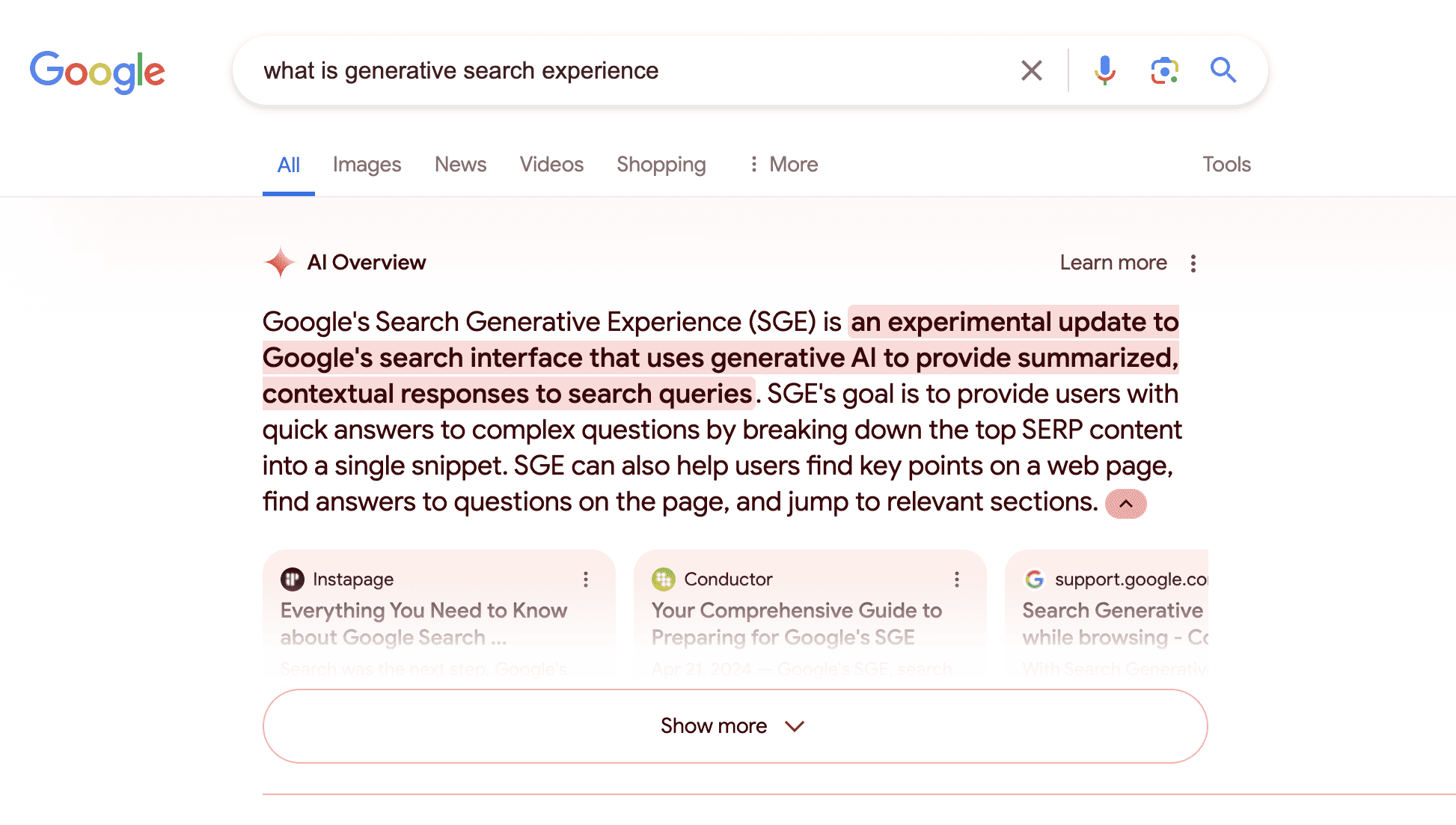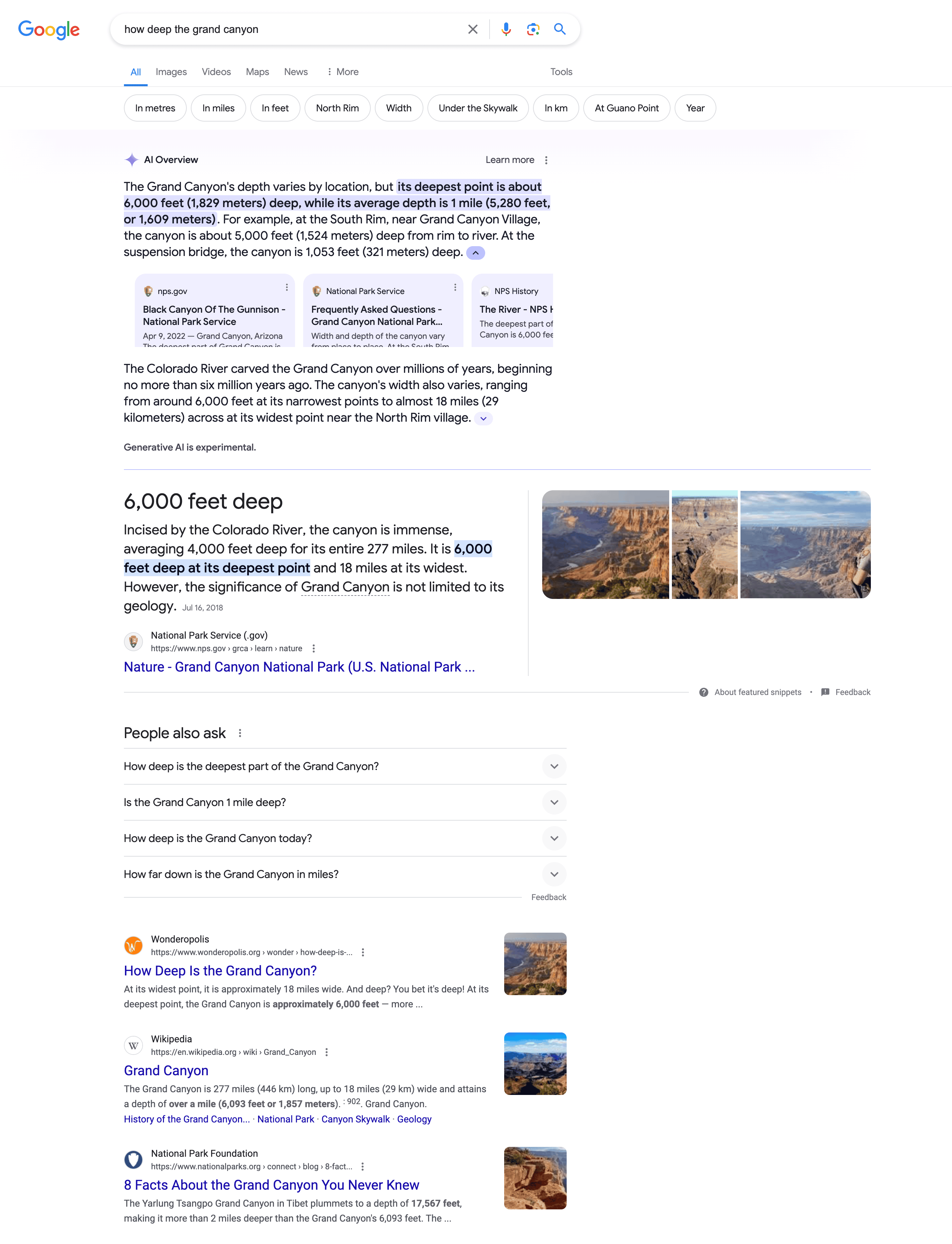Google is changing how search works, and it’s something every small business owner needs to know about. The new Search Generative Experience (SGE) uses AI to deliver quick, clear answers right at the top of search results. This isn’t just a minor tweak; it’s a big shift that could affect how people find your business online.
Back in 2018, Google introduced mobile-first indexing, which completely changed how we approached SEO. In 2014, HTTPS became a ranking factor, pushing many businesses to secure their websites. These changes reshaped how we optimize for search, and SGE is another step in that direction, aiming to make search results more intuitive and user-friendly. Understanding these shifts is crucial to keeping your business visible and competitive.
In this post, we’ll break down what SGE is, how it changes the search game, and what you can do to stay ahead. Let’s dive into the details and see what these changes mean for your business and how you can adapt effectively.
What is Google’s Search Generative Experience (SGE)?
Google’s Search Generative Experience (SGE) is a new approach to search results that leverages the power of AI to provide quick, clear answers to your queries. Instead of presenting a list of links, SGE offers a snapshot of information right at the top of the search results.

This snapshot includes a brief overview or direct answer to your question, with links to additional resources for those who want to dig deeper.
SGE is designed to make searching more intuitive and efficient.
Traditional search results rely heavily on keyword matching and returning a list of relevant pages. In contrast, SGE uses AI to understand the context and intent behind your query, delivering more relevant and nuanced results.
This means users can get the information they need faster and with less effort.
How SGE Works
The magic behind SGE lies in advanced AI technologies, including large language models (LLMs) and natural language processing (NLP). These technologies enable Google to understand and generate human-like text based on vast amounts of data.
- Large Language Models (LLMs)
These are AI systems trained on massive datasets, enabling them to understand and generate text that is contextually relevant and coherent. Google’s PaLM 2 and MUM are examples of such models, helping to generate the concise answers seen in SGE. - Natural Language Processing (NLP)
NLP allows the AI to process and understand the nuances of human language. This means that SGE can interpret complex queries, understand the context, and provide accurate, contextually appropriate answers.
By combining these technologies, Google’s SGE transforms the way search results are generated and presented. Instead of sifting through multiple pages of results, users get a comprehensive snapshot that answers their query directly, with the option to explore further if needed.
The Impact of SGE on Your Business
Google’s new Search Generative Experience\ is more than just a tweak to how search results are displayed; it’s a significant shift that will impact how users interact with search engines and, consequently, how businesses like yours are found online.
Let’s break down the key changes and what they mean for your business.
Changes to the Search Results Page (SERP)
SGE brings a major change to the layout of the Search Engine Results Page (SERP). Traditionally, when you search for something on Google, you get a list of links—some paid ads at the top, followed by organic results. With SGE, there’s now an AI-generated snippet, or AI spotlight, right at the top of the page.
This AI spotlight provides a quick, comprehensive answer to the search query, pushing both organic and paid results further down the page.

For instance, if someone searches for “how deep is the grand canyon” the A.I. result takes up almost the entire screen (before scrolling) and you have to get through it, a featured snippet, and the “People also ask” section before you get the the organic results we’re used to seeing.
Implications for Organic Traffic and Visibility
One of the most significant impacts of SGE is on organic traffic. With the AI spotlight taking prime real estate at the top of the SERP, traditional links, including your business’s organic search results, are pushed down.
This means fewer clicks and potentially less traffic to your website. Imagine having a blog post ranking first for a crucial keyword, only to see a significant drop in visits because the AI snippet now answers the query right away.
The competition for visibility becomes fiercer with this new experience. Since SGE pulls its information from high-ranking pages, only the most relevant and high-quality content will be featured in the AI spotlight. This makes it even more important to ensure your content is top-notch and optimized for search.
Effect on Paid Search Ads
Paid search ads, or PPC (pay-per-click) ads, will also feel the impact of SGE. The AI spotlight’s prominent position means fewer ads are shown above the fold, increasing competition for these valuable spots. For example, if you’re running ads for “affordable SEO services,” your ad might now appear below the AI-generated snippet, reducing its visibility and potentially its click-through rate.
Bug Google makes billions of dollars by advertising to you in the search results — and since they’re in control of search, they’re not going to give that up.
Google is experimenting with new ad formats that integrate more seamlessly with AI-generated results, such as interactive ads that blend into the generative content.
One of the things we’re really keeping an eye on is how Google manages to balance their need to show ads while making their A.I. search results as helpful to visitors as possible after losing some marketshare to other search engines in the past months.
Examples of Potential Impacts
It’s important to understand what practical impacts these changes are going to have on busiensses who have relied on Google’s search results.
Here are a few scenarios:
- Organic Traffic Decrease: A small bakery that used to get most of its traffic from a high-ranking blog post about “easy bread recipes” might see a drop in visitors as users find their answers directly in the AI snippet without clicking through.
- Increased Competition: A local gym promoting its services through SEO might struggle to maintain visibility as more businesses optimize for the same high-quality, relevant content that SGE favors.
- Ad Placement Changes: An online retailer relying heavily on Google Ads for “best budget smartphones” could see their ads pushed down, requiring them to adapt their strategy to maintain ad effectiveness.
These are, of course, just a few examples. But it’s important to understand what threats SGE brings to businesses so we can spot opportunties and come up with solutions.
Speaking of which…
Adapting to SGE: Strategies for Small Business Owners
With Google’s Search Generative Experience changing the way search results are presented, it’s crucial for small business owners to adapt their strategies to maintain visibility and drive traffic. Here are some effective strategies to help your business thrive in the era of SGE.
Content Quality and Relevance
In the world of SGE, content quality and relevance are more important than ever. Google’s AI prioritizes content that is helpful, reliable, and people-first. This means creating content that genuinely answers questions and provides value to your audience.
Think about what your audience needs and how you can provide the most helpful information. Use clear, concise language and avoid jargon unless absolutely necessary. Even citing reputable sources and including expert opinions can enhance the credibility of your content.
For example, if you run a health blog, quoting medical professionals and linking to authoritative health websites can boost your content’s reliability.
Leveraging Schema Markup
Schema markup is a form of microdata that helps search engines understand the context of your content. By using schema markup, you can enhance how your content is presented in search results, making it more likely to be featured in SGE’s AI spotlight.
Schema markup helps search engines categorize and understand your content more effectively. It can lead to rich snippets in search results, which can increase click-through rates and visibility.
By providing additional context, schema markup can make your content more appealing to Google’s AI. This can increase the chances of your content being featured in the AI-generated snippets. Use structured data to mark up important information like FAQs, product details, and how-to guides.
Focusing on Long-Tail Keywords
Long-tail keywords are longer, more specific phrases that users are likely to use when they are closer to making a purchase or when using voice search. These keywords are crucial in the SGE era because they help the AI understand the context and intent behind a search query.
Long-tail keywords are less competitive than shorter, broader keywords, making it easier to rank for them. They capture more specific search intent, which is essential for being featured in AI-generated responses.
For instance, instead of targeting “best laptops,” focus on “best laptops for graphic design students 2024.”
Use tools like Google’s Keyword Planner or Ubersuggest to find long-tail keywords relevant to your business.
Understanding Search Intent
Understanding the different types of search intent and tailoring your content to match these intents can significantly improve your visibility in SGE.
There are four main types of search intent:
- Navigational Intent: Users looking for a specific page (e.g., “Facebook login”).
- Informational Intent: Users wanting to learn something (e.g., “how to bake sourdough bread”).
- Commercial Intent: Users researching before making a purchase (e.g., “best DSLR cameras for beginners”).
- Transactional Intent: Users ready to complete an action, usually a purchase (e.g., “buy running shoes online”).
To tailor your content to match these intents, create content that directly addresses the search intent. For informational intent, write comprehensive how-to guides or FAQs. For transactional intent, ensure your product pages are optimized with clear CTAs and all necessary purchasing information.
“SGE is designed to make search results more intuitive and user-friendly, but this means businesses need to be more strategic in how they optimize their content.”
Fahad Muhammad
Building a Strong Backlink Profile
Backlinks remain a critical factor for SEO, and their importance is underscored in the era of SGE. High-quality backlinks can boost your site’s authority and increase the likelihood of your content being featured in AI-generated snippets.
Building a strong backlink profile involves several strategies.
Guest blogging, for instance, can be an effective way to acquire high-quality backlinks. Write guest posts for reputable sites in your niche and include links back to your own site within the content or author bio.
Another strategy is broken link building. Identify broken links on other websites that point to content similar to what you have, and reach out to the site owner to suggest your content as a replacement.
Promoting your content through social media, email newsletters, and online communities can also increase its visibility and attract natural backlinks. Engage with influencers and industry leaders to share your content and expand its reach.
Preparing for the Future of Search
As Google’s Search Generative Experience (SGE) reshapes the way we think about search, it’s essential to stay informed and proactive. The future of search is full of opportunities, and by adapting to these changes, you can ensure your business thrives.
Keeping Up with Changes in SEO and Search Engine Updates
Change is inevitable, especially in the world of SEO. Keeping up with these changes is crucial for staying competitive. Subscribe to industry blogs, follow SEO experts on social media, and participate in online forums and webinars.
By staying informed, you can quickly adapt your strategies to align with the latest updates and best practices.
Importance of Regular Website Audits and Continuous Optimization
Regular website audits are essential to ensure your site remains optimized and compliant with the latest SEO standards. Check for broken links, outdated content, and technical issues that could affect your site’s performance. Continuous optimization keeps your site running smoothly and helps maintain your rankings.
Imagine your website as a garden that needs regular care. Just as you would pull weeds and plant new flowers, you should regularly update and improve your website to keep it vibrant and appealing.
This proactive approach ensures that your site remains relevant and valuable to your audience.
Leveraging AI Tools
The rise of AI tools presents a fantastic opportunity to streamline your content creation and optimization processes. These tools can help you generate high-quality content faster and more efficiently, allowing you to focus on other aspects of your business.
For example, tools like Jasper and Copy.ai can assist in creating engaging blog posts, social media updates, and email newsletters. They use advanced algorithms to understand your brand’s voice and generate content that resonates with your audience.
Embracing these AI tools can significantly enhance your efficiency and effectiveness in maintaining an optimized online presence. They allow you to focus on strategic decisions while automating repetitive tasks, giving you more time to innovate and grow your business.
Embracing the Future of Search: Your Path to Success
As we’ve explored, Google’s Search Generative Experience (SGE) is ushering in a new era for search, presenting both challenges and exciting opportunities. By understanding what SGE is and how it impacts your business, you can stay ahead of the curve and turn these changes to your advantage.
We’ve discussed the importance of producing high-quality, people-first content and leveraging schema markup to make your content stand out. We’ve also delved into the benefits of focusing on long-tail keywords and understanding search intent to tailor your content effectively. Building a strong backlink profile remains crucial, and we’ve highlighted strategies to acquire quality backlinks that boost your site’s authority.
Adapting to SGE means staying informed, continuously optimizing your website, and embracing AI tools to streamline your processes. Regular audits and a proactive approach will ensure your site remains relevant and competitive.
The future of search is bright, and with the right strategies, you can navigate these changes with confidence and success. If you have any questions or need assistance in optimizing your online presence for this new landscape, don’t hesitate to reach out. I’m here to help you every step of the way.




